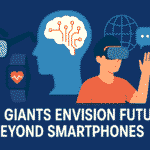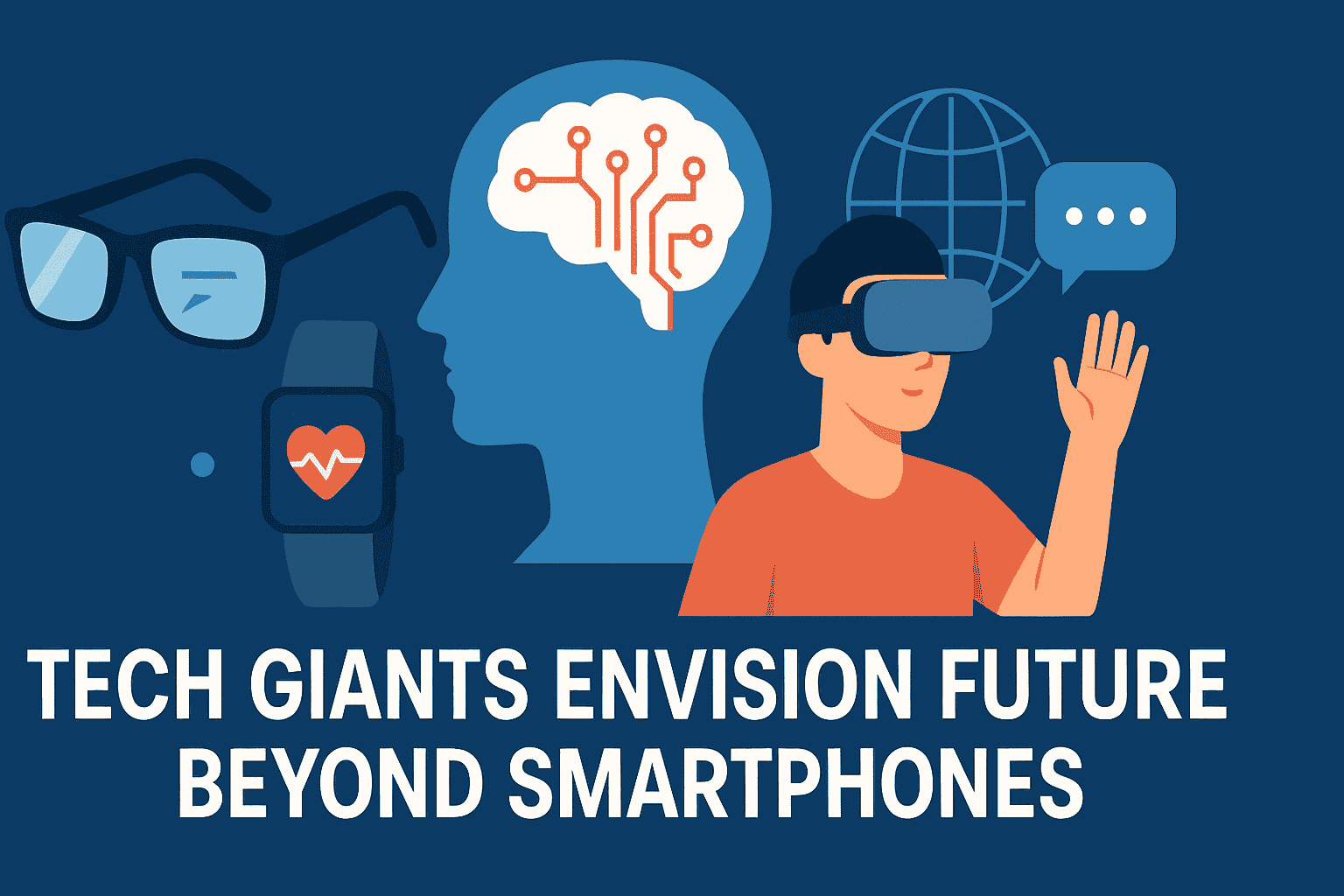The world of technology is changing faster than ever. Every day, we hear about new inventions that promise to change how we live, work, and communicate. For more than a decade, smartphones have been the center of our digital lives. But now, tech giants envision future beyond smartphones—and they are working hard to bring it to life.
Smartphones will not disappear overnight. But companies like Apple, Google, Meta, Microsoft, and Samsung are already building new tools and devices that go beyond the small screen in your pocket. They believe the next big thing will be more natural, more connected, and even more personal.
Let’s explore how these tech giants are shaping the future after smartphones.
Smart Glasses May Replace Phones One Day
Smart glasses are one of the most exciting new technologies. They look like regular glasses but can show digital information right in front of your eyes. Instead of holding a phone, you could just wear glasses and see directions, messages, or even video calls while walking or driving.
Meta (formerly Facebook) has already launched Ray-Ban smart glasses with camera and voice control features. Apple is rumored to be working on its own version. Google is back in the game too, testing new AR glasses after the early Google Glass. These companies believe smart glasses will one day do everything a smartphone can—without needing to pull a device from your pocket.
Augmented Reality Will Blend the Digital and Physical Worlds
Augmented reality (AR) is another major step forward. AR adds digital content to the real world. You could point your glasses at a building and see its history or prices while shopping. AR can also help workers fix machines, doctors plan surgeries, or gamers play in real-world environments.
Apple’s Vision Pro and Microsoft’s HoloLens are clear signs that tech giants envision future beyond smartphones using AR. These devices are like mini-computers worn on your head. While expensive now, the price will likely drop in the future.
Artificial Intelligence Will Become Your Digital Assistant
AI is already changing the way we use technology. With tools like Siri, Google Assistant, and Alexa, we can ask questions or control smart devices using voice. But soon, AI will do much more.
AI assistants will learn your habits, predict your needs, and act on your behalf. They might schedule meetings, order groceries, or remind you of important tasks—all without needing to touch a screen. The goal is to make technology invisible but always available.
When tech giants envision future beyond smartphones, AI is at the heart of that future.
Brain-Computer Interfaces Might Sound Like Sci-Fi, But They’re Real
Some tech companies are working on brain-computer interfaces (BCIs). This means controlling technology with your mind. Elon Musk’s company, Neuralink, is building implants that connect the human brain to machines.
While it may sound like science fiction, this idea could become real sooner than we think. If successful, BCIs might help people with disabilities communicate or control devices without moving a finger. One day, this could even replace typing or tapping on a screen.
Smart Homes and Wearables Are the New Frontiers
Smart homes are filled with connected devices. Lights, thermostats, refrigerators, and even toilets can now be controlled with voice or phone apps. But in the future, they will work together automatically. Your home will learn your habits and make life easier without you even asking.
Wearables like smartwatches and fitness bands are also growing. These devices track your health, send alerts, and keep you connected. As they become more advanced, they may handle tasks your phone currently does.
All of these show how tech giants envision future beyond smartphones, with smart environments that respond to you.
The Role of the Metaverse in a Post-Smartphone World
Meta, Microsoft, and Apple are all investing in the metaverse—a 3D virtual world where people can meet, work, and play. Instead of using apps on a phone, you could attend meetings as an avatar, shop in a virtual mall, or explore a museum from your home.
This vision relies on VR (virtual reality) and AR devices. It may take years to become mainstream, but the seeds are already being planted. If successful, it could reduce the need for phones completely.
Challenges Ahead for a World Without Smartphones
Of course, there are still big challenges. Smart glasses and AR headsets are expensive. Not everyone wants to wear devices on their face. Battery life, privacy concerns, and comfort are all problems that need to be solved.
Also, people are deeply attached to their smartphones. Changing habits will take time. Tech companies know this, so they’re building slowly—step by step.
But make no mistake: tech giants envision future beyond smartphones, and they are investing billions of dollars to make it real.
Why Should You Care About This Future?
You may wonder, “Why does this matter to me?” Well, technology affects every part of our lives. The way we communicate, work, and even relax is shaped by the tools we use.
Understanding where tech is going helps you prepare. Whether you’re a student, worker, parent, or business owner, these changes will touch your life. Knowing what’s coming can help you make smart choices—and even get ahead.
FAQs
What does it mean that tech giants envision future beyond smartphones?
It means companies like Apple, Google, and Meta are developing new technologies that could replace or reduce our dependence on smartphones.
Will smartphones go away completely?
Not right away. Phones will still be important for many years, but new devices like smart glasses and wearables may take over some functions.
What is augmented reality, and how does it replace a phone?
AR adds digital images or information to the real world. You could see texts, maps, or alerts through glasses instead of a phone screen.
How is AI connected to this future?
AI will help create smarter, more helpful digital assistants that understand you and respond automatically—reducing the need for manual phone use.
Are smart glasses available today?
Yes, some early versions like Meta’s Ray-Ban Stories are available, but more advanced models are still being developed.
Is this future safe and private?
That’s a big concern. Tech companies must create systems that protect your data and respect privacy, which is still a work in progress.
Conclusion
The world is changing, and so is technology. Smartphones once felt like the final answer—but now, tech giants envision future beyond smartphones. From smart glasses and AI assistants to AR and the metaverse, the next generation of tech is all about making our lives easier, more connected, and more human.
While challenges remain, one thing is clear: we are just getting started. And the future is closer than we think.







